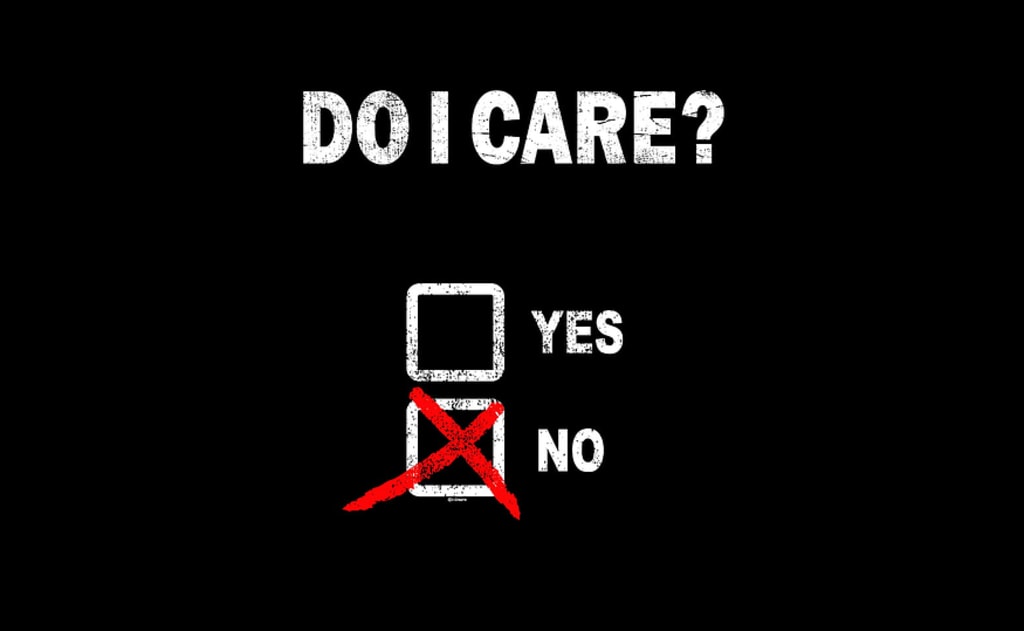I didn’t expect you to care
Caring for others can be counterproductive

Our education when we were young, the environment we grew up in and religion are the main factors which teach us to care for others. We learn from our parents to show empathy towards others and to expect the same from them. Likewise, the environment we grew up in might have individuals who show a lot of concern for us, generally kids of our age also in need of love and affection who probably receive the same lessons. Finally, religion teaches us that we are one, and we should treat others the same. These are the few avenues I could think of which really teach us how to show concern and care for others, there might be more.
Eventually, when we grow up, we realize that this isn’t mandatory, that most people actually don’t care and in some instances caring for others can be counterproductive in the end. You learn that people don’t actually care about you but just themselves, and their empathy towards everybody else is very limited. You learn that it's just a very specific cross-section of persons, mostly those who aren’t too well off and aren’t suffering too much, who show genuine concern and care for others.
This pushes you to question the lessons you’ve received all your life and to reduce the amount of care you show onto others. As a kid, it was easy to see how much care the other person had towards you, they’ll basically show up every time you needed help and reciprocate all of your actions. There was not a divide based on a wealth gap, we were all kids and the only difference was how we interacted with each other's parents. From time to time you might have had better toys than the other person, but that didn’t stop them from using them or affect your friendship so drastically. As adults, just the difference in wealth can determine who does what and who goes where.
People don’t care
There are many reasons which can justify why people don't care. For those struggling, they really don't have much empathy to spare given their condition, and for those doing well off they enter into a situation where they are milked for their empathy so regularly that eventually become numb. In other instances they rather expect empathy from others which they never get because of their wealth, people assume they already have so much empathy.
Definitely the problem isn’t as simple as these few lines can explain, it's a combination of factors which build a complex web of problems. All this finally leads us to adults who don’t care, which seems to be the default option in both cases. You eventually stop caring about others, either because they suffer too much, and you can't afford to help them, or they are too wealthy, and you assume they have enough empathy. It's only when people are averagely on the same level of wealth that there is a sense of empathy and care, or when a person is blessed with a mind which allows them to see beyond wealth. Anything short of this, the default option is either to avoid the persons or milk them for all the care and empathy they have.
Religion teaches us not to factor in a person’s wealth when we want to show care and empathy, to consider everybody equally and to show the same level of care and empathy to all. Whether they are the president or a mad person on the streets. Its definitely not an easy thing to do mainly because of the aspect of reciprocity. When you offer help to a person, there is always a part of you which will expect something in return, at the very least a “Thank You”. When you get nothing in return, this diminishes your willingness to show empathy towards others and from what I’ve been able to observe, this is a cyclic process. One person does it to another, the other person does it to another, and it eventually circles back. You end up with a society which shows less empathy towards each other for basically no major reason.
What makes us different
Wealth difference isn’t the only reason why there are differences in our level of care and empathy towards others, but since we’ve built our whole society, economy and lives around it, everything eventually circles back to wealth. Some other factors include: cultural differences, background, education etc. In some countries, the national culture is one of empathy and care. For example, in Japan, there is a level of care and concern which has to be shown to others. Meanwhile, in the United States, you can just pass by a person agonizing and nobody will even question your decision. Our education also differs a lot, while some people learned about the importance of showing respect, concern, and care for all those around them. Others learn rather to be cautious about their neighbors, not to trust them, and always work hard to overtake them. When different cultures like these meet, the result is always negative.
Caring for the Careless
Can you care for someone who doesn’t care about you? Well, it really takes a lot, which isn’t what the average person can do. Remember the story of the scorpion which was drowning,
basically a scorpion was drowning and a person tried to save it but the scorpion kept striking that person with its sting. You in the place of that person, would you keep trying to save that scorpion or let it drown? That’s precisely what its like to care about a person who doesn’t care about you.
Conclusion
There isn’t a specific lesson to take out from all of this, the reality of life isn’t always a positive one, neither can we solve every problem we meet. I’ll like to tell you to keep showing concern and care for everybody regardless, but that would be destructive advice. The best you can do is to adapt to your environment.
About the Creator
real Jema
If you could say one thing and be heard by the entire world, what would that be?
Enjoyed the story? Support the Creator.
Subscribe for free to receive all their stories in your feed. You could also pledge your support or give them a one-off tip, letting them know you appreciate their work.






Comments (1)
most people actually don’t care